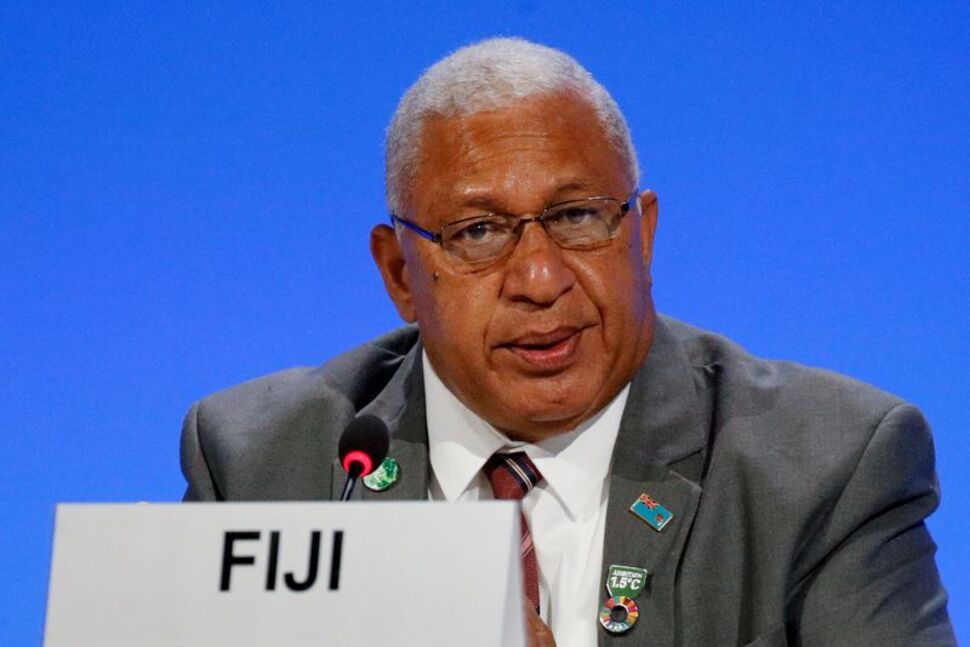(Reuters) – Fiji’s military will help police maintain law and order, Prime Minister Frank Bainimarama said today, citing growing concerns of ethnic tension after an election last week resulted in a hung parliament.
The Pacific island nation, which has a history of military coups, has been pivotal to the region’s response to the competition between China and the United States, and struck a deal with Australia in October for greater defence cooperation, although China has also been a significant donor of military equipment.
Bainimarama, a former military chief who seized power in a 2006 coup, has been prime minister for 16 years, winning elections in 2014 and 2018. He was also chairman of the Pacific Islands Forum when the regional diplomatic bloc held its annual meeting in Fiji earlier this year.
Fiji is now waiting for its president to recall parliament so lawmakers can vote for a new prime minister after no party won a clear majority in the Dec. 14 general election.
Bainimarama’s Fiji First has not conceded defeat, while a coalition of three parties says it has a combined majority and has agreed on the leader of the People’s Alliance, Sitiveni Rabuka, as prime minister. Rabuka is also a former coup leader.
A Pacific trade and transport hub with a population of 900,000, Fiji’s politics was dominated by sometimes tense race relations between its indigenous majority and a big ethnic Indian minority, before constitutional reform in 2013 to remove a race-based voting system that favoured indigenous Fijians.
However, opposition parties accuse Bainimarama of stoking fears of ethnic trouble as a pretext to cling to power.
Bainimarama said the military “has been deployed to complement the police in maintaining law and order”.
“Reports of harassment suffered by our citizens and violence targeted at Indo-Fijian homes and businesses in the wake of the election are deeply disturbing,” he said in a statement on Facebook.
But opposition parties have disputed reports of violence against ethnic Indians in the wake of the election, and have called for evidence of it.
Ethnic Indians posted messages to Twitter under the hashtag FijiIsUnited saying “I fall in the minority group in Fiji & I have felt completely safe”.
Police Commissioner Sitiveni Qiliho said he met on Thursday with Bainimarama, the minister for defence and policing and the military commander and agreed for military personnel “to assist Police with the maintenance of law and order, amidst growing concerns of racial tension”.
The situation will be seen with concern in a region where the United States and China are increasingly vying for influence.
“We encourage all parties to allow the constitutional process to play out,” New Zealand’s Foreign Minister Nanaia Mahuta said in a statement.
‘VOTED FOR CHANGE’
Rabuka, in a post on Twitter, urged people to “respect the rule of law, and to allow the political process to continue without hindrance”.
Fiji’s President Ratu Wiliame Katonivere has until Jan. 2 to summon parliament, media outlet Fiji Village reported, citing a letter sent by Katonivere to the coalition partners. The prime minister must be voted in by more than 50% of lawmakers on the parliament floor.
The Social Democratic Liberal Party (SODELPA), a power-broker holding three seats in the hung parliament, supports policies favouring indigenous Fijians, and on Tuesday signed a coalition agreement with Rabuka’s People’s Alliance and the National Federation Party.
Bainimarama won support from ethnic Indian voters in previous elections but the National Federation Party also draws strong support from that community, analysts said.
However, the SODELPA’s board must meet again on Friday, after the validity of the decision to back the coalition was challenged by the party’s general secretary and Fiji’s Supervisor of Elections.
At a media conference earlier on Thursday, National Federation Party leader Biman Prasad said Fiji First’s secretary general Aiyaz Sayed-Khaiyum, who was the Attorney General in Bainimarama’s government, was “trying to create fear in the minds of people” and should accept the election result.
“He is not accepting they lost this election, people voted for change,” Prasad said.
Anna Powles, from the Centre for Defence and Security Studies at Massey University in Wellington, said the international community would be watching carefully.
“Given Fiji’s recent history there will certainly be concern on the ground in Fiji over the coming days,” she said.
Powles said the drivers of events were domestic political factors rather than part of a broader geopolitical situation.

